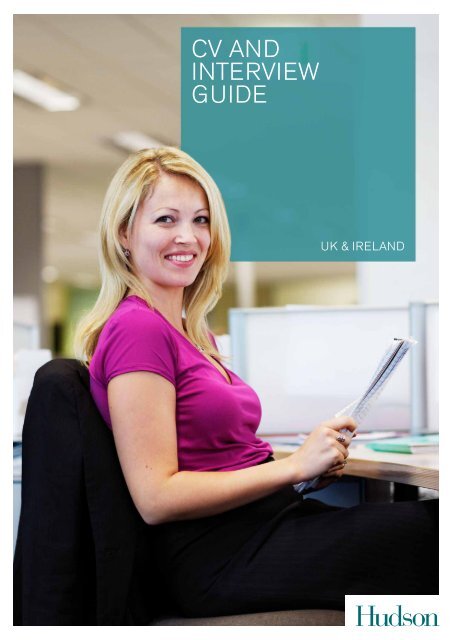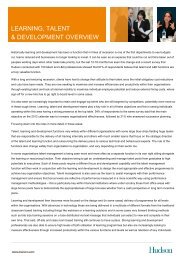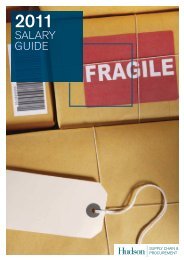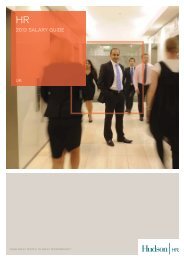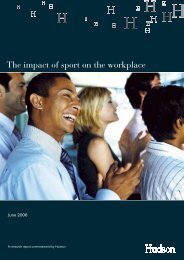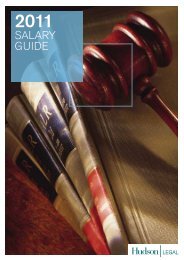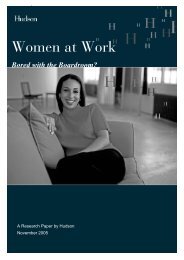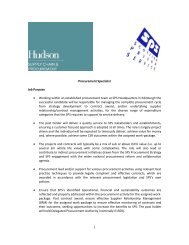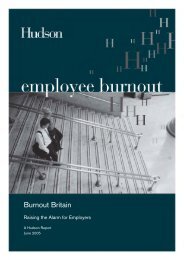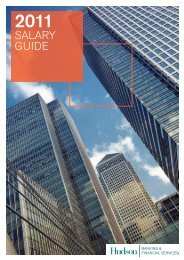CV & Interview Guide from Hudson
CV & Interview Guide from Hudson
CV & Interview Guide from Hudson
Create successful ePaper yourself
Turn your PDF publications into a flip-book with our unique Google optimized e-Paper software.
<strong>CV</strong> and<strong>Interview</strong><strong>Guide</strong>UK & IRELAND
CONTENTS3 How to write a <strong>CV</strong>5 <strong>CV</strong> template6 Writing a covering letter7 Covering letter template8 <strong>Interview</strong> preparation10 general interview questions15 Closing the interview16 Following the interview17 Contact us
How to write a <strong>CV</strong>To ensure you have the best chance of getting your ideal job,your <strong>CV</strong> needs to stand out. Remember that your <strong>CV</strong>’s primaryfunction is to secure you an interview, so you should forgetgraphics and gimmicks; instead, opt for clean, white paper andeasy to read presentation.It is very important to sell yourself on the first page. Highlightyour achievements and responsibilities in bullet points. Your<strong>CV</strong> needs to grab the attention of its reader within seconds ifyou’re to stand a chance of progressing to the job interviewstage. Hiring managers can receive hundreds of applicationsfor a role, and tend to only have the time to scan <strong>CV</strong>s beforedeciding whether to progress further with a candidate. Makesure the prospective employer sees the value you can bring tothe position.IIIIDo NOT include a title page or a photo as it takes upunnecessary space.Including your full address is very important, particularlyin large cities where it may take some time to travel toand <strong>from</strong> work.EDUCATIONInclude details of your education; state the level and the yearof any degrees you have obtained. Also include your A-levelsubjects and results or equivalent. Do not include universitytranscripts. You should also list professional education afterschool/university details.Ensure you highlight relevant educational qualifications,particularly when they’ve been listed as essential or desirableon the selection criteria.EMPLOYMENT HISTORYIf you have room you can talk about your most recent roleon the front page, but only if it all fits in. Otherwise start youremployment history on the second page.You’ll need to tailor your <strong>CV</strong> to each particular job that youapply for, so it’s vital that the job titles and the responsibilitiesyou include in your <strong>CV</strong> are relevant for the role on offer.IIMake sure you state the details of any relevant work visa.Consider the following when writing this section:PERSONAL SUMMARYIf you are going to include a personal statement or yourobjectives, avoid using too many generic adjectives: everyoneperceives themselves to be self-motivated, proactive and ateam player, so include some skills and characteristics that aremore unique to you personally. If you do include this section itcan be on the front page or at the end, it is your choice.IIIIIIIIAs a guide, cover the last five years of your career; priorto this only provide details of any positions that arerelevant to the type of work you are applying for.Lay your work history out in chronological order, startingwith your most recent position.Cover any gaps in employment by giving reasons fortimes of unemployment, such as travel or study forexample.Include the name of the company you worked for, theposition you held, the dates you were employed <strong>from</strong> andto (month and year, NOT just the years), and brief detailsof your responsibilities.3
IIIIUse a variety of font sizes and underline, bold or italicwords to make important information stand out.Avoid giving too much detail of your positions; longwindedexplanations of previous day-to-day tasks maylose the readers’ interest.<strong>CV</strong> CHECKLISTDo:IIIIKeep it brief, no more than two pagesList your career history in chronological orderIIIIDetail any results and key achievements which arerelevant to the role you’re applying for. Make sure youstate your targets as amounts or percentages, anddemonstrate how you’ve overachieved.Add in your skills. This will complement your experienceand should ultimately illustrate your suitability for the jobon offer.IIIIIIIICover all gaps in employmentList educational institutions and qualifications inchronological orderState the month and year that you started and finishedeach roleStart sentences with verbs, stick to the same style ofwritingREFEREESHere you can either list details of your referees or simply put‘details available on request.’ If you are going to include nameand contact details of your referees, ensure that you includeaddress, phone and email address.PERSONAL INTERESTSUnder personal interests include anything relevant to theapplication or culture of the company. For example, charity orvolunteer work and sporting achievements may be relevant tosome companies. Keep this section brief.Finally, ensure that you update your <strong>CV</strong> regularly.IIIIIIIIDon’t:IIIIIIIIInclude achievements and responsibilitiesDetail your computer skills, language skills and anyrelevant trainingCheck for typos and ask a someone to check over your<strong>CV</strong>Clearly label the file name of your <strong>CV</strong> to include yourname i.e. Smith,Chris-<strong>CV</strong> in the saved title.Exceed five pagesInclude graphics or gimmicksList personal detail such as age, religion and sex etcFormat your <strong>CV</strong> in such a way that the recipient won’tbe able to open it easily, they will not want to downloadsoftware to view a <strong>CV</strong>.4
<strong>CV</strong> templateThis is a general guide for presenting your <strong>CV</strong>:First name Last nameAddressPhone numberEmail addressBrief personal statement: a summary of your experience to date and what you can offer the employer.Try to make this concise and tailor to your specific skill set.Career historyStarting with your most recent employer, list your previous roles in chronological order:Job title, company nameDate <strong>from</strong> and to:••Key responsibilities••Key responsibilities••Key responsibilitiesSkills and achievementsA few short bullet points describing relevant key achievements and skills <strong>from</strong> your career to date.••Achievement••Core skill••Achievement••Core skillEducation and trainingStarting with your most recent qualification, list your education in chronological order:Date <strong>from</strong> and to, institution••Subject, grade achieved••Other relevant awards / achievementsInterests and activitiesGive prospective employers an overview of your personality by writing a short description of yourinterests outside of work.ReferencesDetails available on request.5
Writing a coveringletterA good covering letter, more likely to be an email nowadays,will make your <strong>CV</strong> stand out <strong>from</strong> others. The following pointswill help ensure your <strong>CV</strong> is opened:1. Address the email to the contact mentioned in the jobadvert and quote the reference number.2. Briefly describe your current job situation and yourreasons for looking to move on.7. Make sure it’s clear, brief and has no typos orgrammatical errors.8. Finish by expressing interest in discussing yourapplication further.3. Show you’ve done your research on the company andwhy you are interested in them as an employer.4. Explain why they should be interested in you as anemployee.5. Tailor your information to reflect the job requirements.6. Outline your transferable skills and achievements.6
Covering lettertemplateThis is a general covering letter template:Dear Mr/Mrs/Miss {Last name},In response to your recent advertisement for ‘Job Title - UK123456’ on uk.hudson.com, please find attached my curriculumvitae for your consideration.I have the following experience which is relevant to the requirements of the role:••Successful {area of expertise} specialist with {number} years’ experience••Thorough understanding of {your market}••Experience of working in {sector(s)}.In my current role, I have achieved the following:••Established relationships with {relevant functions/clients/suppliers}••Increased productivity and revenue by 30% YOY {key achievement statistics}••Managed multiple projects alongside day to day activity; {achievements outside of your normal role}.I feel that my experience to date and achievements are well aligned to the requirements of this role, and I am confident that Iwill be a valuable asset to the company.If you have any questions please do not hesitate to contact me, and I will look forward to hearing your thoughts.Kind regards,[Your name]•[Phone number]•[Email address]7
<strong>Interview</strong>preparationPreparation is the first essential step towards a successfulinterview. <strong>Interview</strong>ers are continually amazed at the numberof applicants who drift into their offices without any apparentpreparation and only the vaguest idea of what they are goingto say. It is important to:IIIIIIIIIIIIKnow the exact place and time of the interview, theinterviewer’s full name, the correct pronunciation andtheir title.Check the location before the day and explore alternativeoptions of transport.Dress conservatively and preferably in darker colours,paying attention to all facets of your dress and grooming.Ensure complete understanding of the company you aregoing to see. It is essential to conduct thorough research.Look out for all relevant additional information includingnewsworthy items. Also, talk to friends or colleagues thatwork(ed) at the organisation, read through press releaseshighlighting recent successes.Highlight on the job specification the skills required andessential responsibilities, know where your role will fitinto the organisation.Refresh your memory on the facts and figures of yourpresent or former employer. You will be expected toknow a lot about the company for which you currently orpreviously worked.Probing questions you might ask include:IIIIIIIIIIIIIIIs there a detailed description of the position? Whatis the structure of the team and why is the positionavailable?What is the culture of the company?Why is the position available?What is the anticipated induction and trainingprogramme?How do you see this role developing over the next twoyears?What is the staff retention rate like?What are the company’s growth plans?You are being interviewed because the interviewer wantsto hire somebody, not because they want to trip you up orembarrass you. Your <strong>CV</strong> has impressed the interviewer, andnow you need to support this in your performance at theinterview.Through the interaction that takes place during the interview,the interviewer will be searching out your strong and weakpoints, evaluating you on your qualifications, skills andintellectual qualities. They will probably probe deeply todetermine your attitudes, aptitudes, stability and motivation.IIIIRead through and know your <strong>CV</strong> inside out, includinghighlights and/or challenges overcome in relation toeach project.Prepare the questions you will ask during the interview.The employer will try to determine through questioningif you have the qualifications necessary to do the job,and you must determine whether the company will giveyou the opportunity for the growth and development youseek.8
<strong>Interview</strong> checklistDon’t:Do:IIIIIIIIIIIIDO arrive on time, ideally 15 minutes early. Always leaveplenty of time. Late arrival for a job interview is neverexcusable.DO read any marketing literature in reception, as theremay be some useful information in it, and it showsgenuine interest in the company.DO shake hands confidently and firmly.DO wait until you are offered a chair before sitting. Situpright in your chair. Look alert and interested at alltimes.DO be a good listener as well as a good talker, andremember to smile.DO look a prospective employer in the eye.IIIIIIIIDON’T answer questions with a simple ‘yes’ or ‘no’answer. Offer an explanation whenever possible, givingsuccinct, practical examples.DON’T lie. Answer questions truthfully, frankly and asdirectly as possible.DON’T make derogatory remarks about your present orformer employers, companies, colleagues, industry orculture.DON’T enquire about salary, holidays, bonuses, at theinitial interview unless you are positive the employeris interested in hiring you and raises the issue first.However, you should know your market value and beprepared to specify your required salary or range. Liaisewith your <strong>Hudson</strong> consultant regarding your market valueif you are unsure.IIDO follow the interviewer’s lead but try to get them todescribe the position and the duties to you early in theinterview so that you can relate your background andskills to the position.IIDO ensure that your strengths are transmitted to theinterviewer in a factual, sincere manner. Make themrealise the need for you in their organisation.IIDO be prepared to answer technical questions. Hopefullyyou will know the answers but if not DON’T guess. Ifyou are unsure, then be honest and say, “that is beyondmy experience but this is where I would go to find theanswer” or “I haven’t encountered this situation before,however, what I would do is...”IIDO include all the interviewers present, even if one ofthem is more of an observer. Their opinion on you will besought after the interview.IIDO conduct yourself as if you are determined to get thespecific job you are discussing, even when applying fora number of roles. It is better to be in the position whereyou can choose <strong>from</strong> a number of options rather thanonly one.9
General <strong>Interview</strong>QuestionsThe short time you spend in an interview could have adramatic effect on your career prospects. Therefore, it isimportant that you perform well because no matter how goodyour career record is to date, the job interview remains keytowards fulfilling your ambitions.collaboration, time management, stakeholder management,ability to motivate others and general communication skills areimportant.Choose three, stick with it and practice delivering examples.These tips, combined with the guidance provided by ourconsultants, will equip you with valuable information on how toconduct yourself during interviews.typical <strong>Interview</strong> QuestionsTell me about yourself?Delivering a mixture of professional and personal experiencesare important. Talk about your background, interests, degree,where you lived, why you liked it and why you chose the careerpath you have.Answer no longer than five minutes on this question and noless than three minutes.How would your friends describe you?Answer this question with confidence and conviction – eithergive your answer followed by a brief example or bullet pointyour three and then follow up with examples.What is important to you in your career over the next twoyears?Know what you want <strong>from</strong> your career. For some peopledeveloping IT skills or achieving a specific qualification isimportant over the next two years. For others it is greaterresponsibility or overcoming particular challenges. Talkabout growth and development and how you want this to beachieved.Try not to talk about where you want to be in two years butrather what you would like to see happen in your career overthe next two year period.Give me one weakness you have?This could be either a personal or professional weaknesswhich could also be a strength. Explain how you arecombatting this weakness, for example - i’ve had somechallenges in the past with work-life balance but i’ve taken thetime to learn better time and project management processes.Examples – sociable, loyal, committed, honest, fun, determinedetc. Remember the question is how would your ‘friends’describe you so think about more ‘non-work’ related words.What are your top three strengths?The most important question. You MUST perfect this answer.What motivates you?Think about why you work and why you selected your chosencareer path, and match it against the reasons for wantingto be good at it. Some examples of drivers are recognition,challenges, success and making a difference.Most people have five key strengths – select your topthree. Remember it should reflect your career path, so if forexample you are a project manager then organisational skills,10
Where do you see yourself in five years time?You need to know where you are going. This demonstratesfocus and direction. Where will you be? Size of company,location, job title, responsibilities, management position and inwhich industry. Be clear on this before you go to interview.If I were to call your boss, how would they describe you?Compared to the friends question answered previously, thinkof more professional adjectives such as committed, hardworking, sociable, tenacious, team player, goes beyond thescope of duty, reliable, regularly exceeds expectations.Telephone <strong>Interview</strong>sIIAt the very minimum you should brush up on thecompany’s business structure, clients, products, industryterminology, or anything else that may relate to theposition you are applying for. Spending an hour or tworesearching these things before you do an interview canmake a great impression and possibly land you a secondinterview or even a job.IIIIKeep a glass of water handy.Smile. Smiling will project a positive image to the listenerand will change the tone of your voice.Be prepared to answer questions such as:IISpeak slowly and enunciate clearly.IIIIIIIIIIIIIIWhy did you choose this particular role?What do you really want to do in your next career move?Why would you like to work for this company specifically?What style of management brings out the best in you?What interests you about our products or services?What have you learned <strong>from</strong> some of the jobs you haveheld? Which did you enjoy most and why?Give an example of a difficult situation you experiencedat work and how you overcame it.IIIIIIIIIIKeep your <strong>CV</strong> in clear view, near the phone, so it’s at yourfingertips when you need to answer questions.Have a short list of your accomplishments available toreview.Have a pen and paper handy for note taking.Turn call-waiting off so your call isn’t interrupted.Make sure your phone is charged and you are in an areawith reception.Be prepared for different interview styles.IIIIIIIIGive an example of where you went out of your way tohelp a colleague.What does ‘teamwork’ mean to you?Are you willing to relocate?How do you spend your spare time? What are yourhobbies?IIIIIIIICompetency-basedPanelTechnicalFormal/informalIIWhat type of books do you read? What was the last one?IIWho else are you applying to/interviewing with?11
COMPETENCY-BASED INTERVIEW QUESTIONSCompetency-based interviews involve a specific style ofquestioning. Although not commonly referred to in such aliteral way, it is a modern style of interview that you should beaware of and prepared for.This style of interviewing is used so that you can best showhow you would demonstrate certain behaviours and skills inthe workplace, by answering questions about how you havereacted to and dealt with previous workplace and personalsituations. By using past experience, a potential employer canpredict future behaviour.You will be asked to give an example of a situation or task thatled you to take a certain course of action. Probing questionswill then be used to determine the course of action you took,what changes were facilitated by those actions and the effectsof those actions on others.To prepare yourself for competency-based questions, use theSTAR method of structuring your answer.Situation - describe the situation or problem you haveencountered.Task - describe the task that the situation required or yourideas for resolving the problem.Action - describe the action you took and obstacles that youhad to overcome.Result - highlight outcomes achieved, results should be yourfocus.Example 1 - PLANNING and ORGANISINGThe interviewer will be looking for you to demonstrate thefollowing traits and behaviours when answering questions onthis competency:IIIIis personally well organised and keeps focused onpriorities in own and others’ workdevelops and monitors clear and realistic action plans toaccomplish given objectives using given resources.Questions you may be asked:Describe a time when you had to organise the implementationof a plan.IIIIIIWhat were the key stages you worked through?How did you ensure the plan was followed?How did this work in practice?Tell me about a time when you were unable to deliver what youpromised to deliver.IIIIIIWhy did this happen?To what extent were you responsible?What did you do to try and overcome the problem?Tell me about a situation when a number of projects neededyour attention.IIIIWhat were the projects?How did you manage your limited resources?IITo what extent did the different projects succeed?Give me an example of when you had to work towards animportant deadline.IIIIIIWhat measures did you take to ensure you met thedeadline?What did you find most challenging in respect to planningand organising?Why were these elements challenging?12
Example 2 - JUDGEMENT and DECISION-MAKINGThe interviewer will be looking for you to demonstrate thefollowing traits and behaviours when answering questions onthis competency:Example 3 - DRIVE and COMMITMENTThe interviewer will be looking for you to demonstrate thefollowing traits and behaviours when answering questions onthis competency:IIselects and uses relevant information to make sound andbalanced judgementsIIhas the determination, effort and enthusiasm to deliverresultsIIevaluates the risks of alternative options and makesconfident decisions in the face of uncertainty orincomplete knowledge.Questions you may be asked:Tell me about a time you took responsibility for making a keydecision.IIIIWhat was the decision you made?How did you justify your decision?Sometimes we have to make decisions that are challenged byothers. Describe a situation when you made a decision thatwas challenged.IIIIIIWhat was your decision?How did the people who were affected react?How did you respond to people who challenged yourdecision?Describe a time when you referred an urgent decisionupwards?IIIIWhat was the background?Why did you need help?Tell me about a decision you made that involved an element ofrisk.IIIIWhy did you need to make the decision?What were the consequences?IIis energetic, takes the initiative, originates action andkeeps things moving.Questions you may be asked:Give me an example of when you set yourself a challengingtarget.IIIIIIWhy did you set yourself the target?What made it so challenging?What was the outcome?Give me an example of when you took the initiative and madesomething happen.IIIIIIHow did you progress the idea?How did you gain support for the initiative?What was the impact of your initiative?Tell me about a time when a project you were working on didnot go as planned.IIIIIIWhat didn’t go well?How did you feel?How did you react?Give me an example of when you did more than was asked ofyou.IIIIIIWhat was the situation?What did you do?What was the result?13
Negative factors to watch forDuring the course of an interview the employer will beevaluating both your positive and your negative traits. Listedbelow are negative factors frequently evaluated during thecourse of an interview and those that most often lead torejection:IIIIpoor personal appearanceoverbearing or aggressive, conceited superiority complex,or know-it-all personalityIIIIIIIIIIIIover-critical comments of previous employersfailure to maintain eye contactpoor posturelack of preparation for interview or failure to obtaininformation about the companyoverbearing perfume, aftershave or smell of smokelack of intelligent and intuitive questions.IIIIIIIIIIIIIIinability to express thoughts clearly and poor diction orgrammarlack of career planning with no purpose or goalslack of interest and enthusiasm, passive and indifferentdemeanourlack of confidence or signs of nervousnessover-emphasis on benefits or salaryacting evasively when challenged about aspects of your<strong>CV</strong> or applicationlack of tact and courtesy14
Closing theinterviewIIIf you are interested in the position, make your feelingsclear. You could do this by voicing your desire to meet theteam.interviewer who is genuinely interested in your skills andexperience may seem to discourage you in order to testyour reaction.IIIIDon’t be too discouraged if a definite offer is not made,or specific salary discussed. It is usual for the interviewerto want to communicate with their office first or interviewmore applicants before making a decision.If you get the impression that the interview is not goingwell and that you have already been rejected, don’tlet your discouragement show. Once in a while anIIThank the interviewer for their time and consideration.You have done all you can if you have answered thequestions uppermost in the interviewer’s mind, which are:- Why are you interested in the job and the company?- What can you offer and can you do the job?15
Following theinterviewLastly and most importantly, call the consultant who referredyou to the position after the interview and explain whathappened. They will want to run through your initial feedbackbefore the interviewer calls them back.It is helpful to follow up in an email, as the consultant willbe able to forward this to the appropriate contact at theorganisation.If you are interested in progressing further it will help if yourfeelings towards the position are known, together with yourperception of what the interviewer’s reaction is likely to be.16
Contact usAberdeen4 - 5 Golden SquareAberdeenAB10 1RDTel: +44 1224 620 262glasgow130 St Vincent StreetGlasgowG2 5HFTel: +44 141 221 8182BirminghamVictoria Square HouseVictoria SquareBirminghamB2 4AJTel: +44 121 633 0010LondonChancery House53 - 64 Chancery LaneLondonWC2A 1QSTel: +44 20 7187 6000dublin10 Lower Mount StreetDublin 2Tel: +353 1 676 5000manchesterThe Chancery58 Spring GardensManchesterM2 1EWTel: +44 161 832 7728edinburghCaledonian Exchange19a Canning StreetEdinburghEH3 8EGTel: +44 131 555 4321Milton Keynes500 Avebury BoulevardMilton KeynesMK9 2BETel: +44 1908 547 995readingGreyfriars Gate5 - 7 Greyfriars RoadReading, BerkshireRG1 1NUTel: +44 118 939 1003uk.hudson.comhudson.ie17


